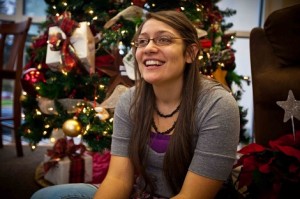Christmas Around the World is a 10-part series. This audio podcast is narrated by Romelia Alvarado. She lived seven years in Guatemala with her missionary parents before moving to Louisville, Ky. Today, she works in Vancouver but returns often to visit her family in Kentucky. Podcast: Download (Duration: 4:16 — 5.9MB)
Romelia Alvarado: Columbia. Christmas is a public holiday in Colombia and is primarily a religious celebration. Presents are brought by El Niño Jesus or Niño Dios which means Baby Jesus instead of Papá Noél (Father Christmas), whose gift giving role has been downplayed some by the Church. However, Santa Claus is still an important Christmas figure, as Santa decorations are common, and Santa can be seen posing for pictures at shopping malls.
While Christmas decorations may be put up as early as the beginning of November, the unofficial start of Colombian Christmas festivities takes place on December 7, Día de las Velitas, or “Day of the Candles.”At night, the streets, sidewalks, balconies, porches, and driveways are decorated with candles and paper lanterns, which illuminate cities and towns in a yellow glow to honor the Immaculate Conception on the following day, December 8.
In many cities, and even in small rural towns, neighborhoods get together and decorate their whole neighborhood or street, turning streets into virtual “tunnels of light.”
Activities such as musical events and firework displays are planned by cities and held during this time. Individually launched fireworks were a common item during the Christmas season in Columbia.
December 16 is the first day of the Christmas Novena, a devotion consisting of prayer said on nine successive days, the last one held on Christmas Eve. The Novena is promoted by the Catholic Church as a staple of Christmas, and is very similar to the posadas celebrated in Mexico. It is a call for an understanding of the religious meaning of Christmas, and a way to counter the commercialism of the Christmas season.
Individual traditions concerning the Novena may vary, but most families set up a pesebre (manger scene), sing religious Christmas carols called villancicos accompanied by tambourines, bells, and other simple percussion instruments, and read verses from the Bible, as well as an interpretation which may change from year to year.
Novenas serve as beautiful religious gatherings as well as learning environments for young children since kids have a central and active role in the celebration of the Novenas They read prayers, sing, and play instruments guided by their family.
From December 16 to 18, games called aguinaldos are played after having made a “pinky promise” deciding the prize for the winner and the punishment for the loser. The games include Hablar y no contestar (Give but don’t receive), Pajita en boca (Straw in the mouth), Tres pies (Three feet), Beso robado (Stolen kisses), and Si y al no (Yes or no).
Churches offer dawn and nightly masses during the nine days of the Novena, culminating with the Misa de Gallo (Rooster’s Mass) on Christmas Eve at midnight.
Christmas Eve is the most important day of Christmas in Colombia. Families and friends get together to pray the last Novena and wait until midnight to open the presents. Parties are held until sunrise on Christmas Day. Kids stay up late playing with their new presents, and fireworks fill the skies.
Families gather around meals, music, and singing. Because Christmas Eve is the most important day, little occurs on December 25. Families join Christmas Day mass although it is not nearly as festive as Christmas Eve.
CREDITS
Audio captured and edited by Ed Stortro
Audio transcription by Ed Stortro
Voice over Romelia Alvarado










